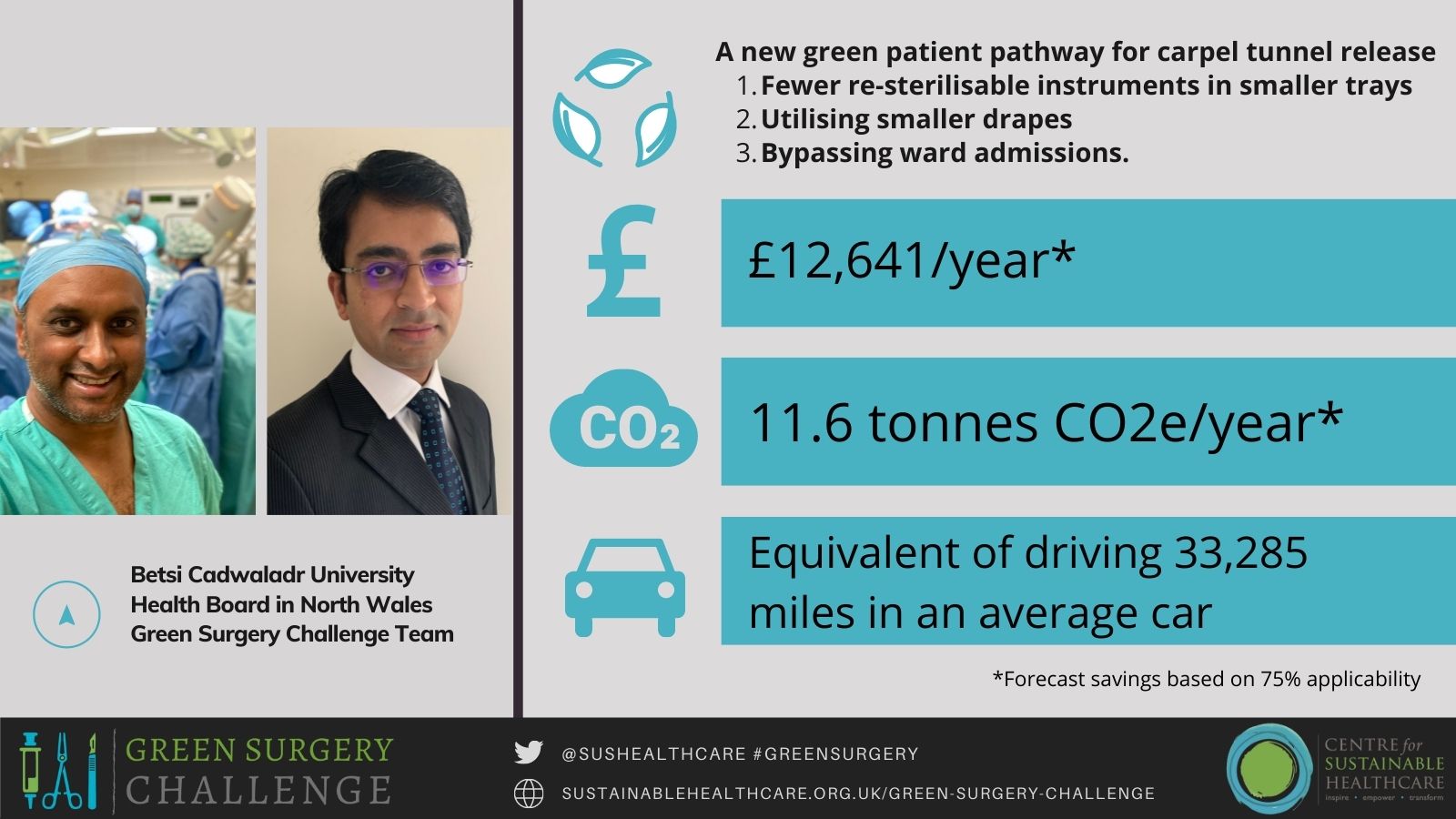
Introducing team 4 of the Green Surgery Challenge
The Green Surgery Challenge team at Wrexham Maelor and Ysbyty Gwynedd Hospitals, Betsi Cadwaladr University Health Board in North Wales, focused on the carpal tunnel release pathway as this is the most commonly performed procedure in the field of hand surgery. They considered the whole pathway and chose interventions that would reduce the consumption of single-use surgical equipment and reduce energy use by moving out of the operating theatre, reducing size of autoclave trays by streamlining the reusable surgical sets and eliminating the need for ward admission.
These approaches are examples of the third and fourth principles of sustainable clinical practice; ‘lean’ service delivery, low carbon alternatives to existing practices and also reduce operational resource use.
 The multi-disciplinary team was led by Mr Prash Jesudason and Mr Preetham Kodumuri, Consultant Hand & Orthopaedic Surgeons. Team members include Iona Williamson, Sterile Services Manager, Teresa Revell, Deputy Team Leader Day Case Unit, Shan Roberts, Theatre Practitioner and Jack Houghton, Specialty doctor in Orthopaedics.
The multi-disciplinary team was led by Mr Prash Jesudason and Mr Preetham Kodumuri, Consultant Hand & Orthopaedic Surgeons. Team members include Iona Williamson, Sterile Services Manager, Teresa Revell, Deputy Team Leader Day Case Unit, Shan Roberts, Theatre Practitioner and Jack Houghton, Specialty doctor in Orthopaedics.
Read the full case study here.
Summary
The team listed all the consumables used and the volume of clinical waste generated whilst performing a CTR. They used this to identify what changes could be made:
- Single use plastic pots and bowls were abandoned and replaced with reusable plastic receiver,
- Large limb drapes (required for hip or knee replacement but not hand surgery) were replaced with 2 x small 90cm square drapes
- A large number of reusable surgical instruments in the procedure set were reduced, meaning that the containing tray size could be reduced (meaning that more trays can be accommodated in the autoclave per cycle)
The team made these changes, creating a new procedure pack.
The team also gained approval from the theatres manager to carry out CTR in a procedure room rather than theatres (theatres have a high energy requirement, mostly due to the ventilation systems) and for patients to bypass ward admission and come straight to the procedure room. They approached the project using the Sustainable Quality Improvement (SusQI) framework:
- Environmental and financial impact was determined by calculating the carbon footprint and cost of those resources that were eliminated from the pathway.
- Social impact was determined by actively seeking input from patients and employees participating in this green pathway using feedback questionnaires and a pathway folder for suggested improvements. The safety of the pathway was tested with Local Safety Standards for Invasive Procedures (LocSSIP) checklist. At the conclusion of each list, a debriefing meeting was held to examine the day's events and to identify what went well and what could be improved.
Carbon and Financial Impact
This project demonstrated that this ‘green carpal tunnel pathway’ was not only safe but also increased productivity, had a lower environmental impact, a lower economic cost and also reduced time in the hospital for patients. The project has forecast annual savings of £12,641 and 11.6 tonnes CO2e/year (based on 75% applicability). This is the same amount of CO2e as driving 33,285 miles* in an average car (58 times from G7 to COP26).
*CO2e comparison: Distance from G7 (Carbis Bay, Cornwall) to COP26 (Glasgow): 573 miles / 922 km. Average car (unknown fuel) GHG emissions: 0.34851kgCO2e/mile.

Dr Olivia Bush, Programme Lead for Sustainable Clinical Practice at the Centre for Sustainable Healthcare, said:
Strengths of this project were the modelling of a truly multi-disciplinary membership of the team, and this is essential for effective transformation for green, sustainable surgery that requires leadership with a systems-thinking approach. This project effectively challenged the assumption that surgical procedures must take place in theatres, when minor surgery can be carried out in rooms with lower energy requirements. In addition, the team not only modelled the likely impact of their proposed changes but they also implemented them, which was challenging in the context of disrupted surgical lists in the midst of the pandemic and the 10-week timescale of the Challenge.
The Green Surgery Challenge is a special adaptation for clinical specialties of the Centre for Sustainable Healthcare’s flagship programme, the Green Ward Competition (an award-winning clinical leadership and engagement programme to improve the environmental sustainability of healthcare). The challenge has been created and delivered through collaboration with a group of supportive partners including NIHR MedTech Co-operative in Surgical Technologies, Royal College of Surgeons England, Royal College of Surgeons Edinburgh, The Sustainable Healthcare Coalition, Brighton and Sussex Medical School and the Association for Perioperative Practice. The Challenge has been made possible through the generosity of our Gold Funders and Sponsors NIHR MedTech Co-operative in Surgical Technologies and Elemental Healthcare, Silver Sponsors Royal College of Surgeons England and Royal College of Surgeons Edinburgh, Bronze Sponsors the AHSN Network, Vanguard Medical Remanufacturing, and Bowa Medical UK. For more information, please click here.

